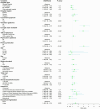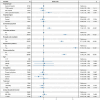Unveiling Patient Trust in Physicians Across China: Insights from a Nationwide Cross-Sectional Study
- PMID: 38680478
- PMCID: PMC11055546
- DOI: 10.2147/RMHP.S456585
Unveiling Patient Trust in Physicians Across China: Insights from a Nationwide Cross-Sectional Study
Abstract
Background: Trust is a major factor affecting patient-physician relationship and healthcare quality. However, there has been a lack of comprehensive study on the extent of and major factors affecting patient trust in healthcare providers of China, the world's largest developing country. The objective of this study is to elucidate the current status of outpatient trust in physicians in China and its influencing factors, providing empirical evidence to enhance doctor-patient trust and improve doctor-patient relationships.
Methods: Between December 2017 and January 2018, 28,760 patients seeking care at the outpatient departments of 136 tertiary hospitals were interviewed, where they were asked to rate their trust in physicians. We applied a multilevel logistic regression model to explore the association between patients trust and characteristics of hospitals, physicians and patient characteristics. We conducted a series of sensitivity analysis to check the robustness of our findings.
Results: Among 28,760 participants included in this study, 91.54% expressed trust in their physicians, while 7.52% showed moderate trust. Only 0.94% expressly distrusted or strongly distrusted their physicians. Outpatients of hospitals with convenient payment, volunteer guidance and enough seats available in the rest and waiting area showed higher levels of trust. Physicians who had a senior title, showed patience and protection of the patient's privacy were more likely to be trusted by their patients in the outpatient setting. Compared to their female counterparts, male outpatients showed a higher degree of trust.
Conclusion: While this study highlights an overall high level of Trust in physicians (TIP) among patients in China's tertiary hospitals, it is found to vary with patient demographic factors as well as provider's attributes. Hospitals with a more keen sense of protecting patients privacy and better meeting patients' need for efficient and caring service provision process appeared to yield a higher level of trust.
Keywords: national survey; outpatients; trust in physicians.
© 2024 Mi et al.
Conflict of interest statement
The authors have no relevant financial or non-financial interests to disclose for this work.
Figures
References
LinkOut - more resources
Full Text Sources



